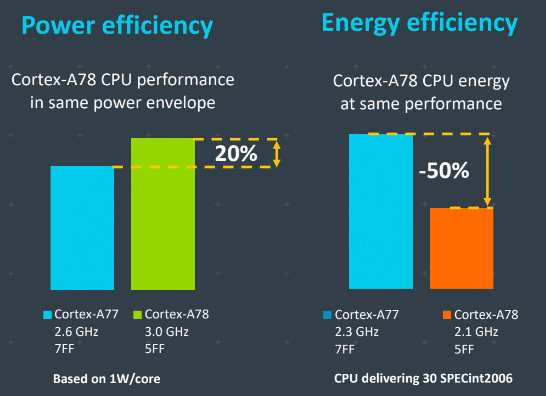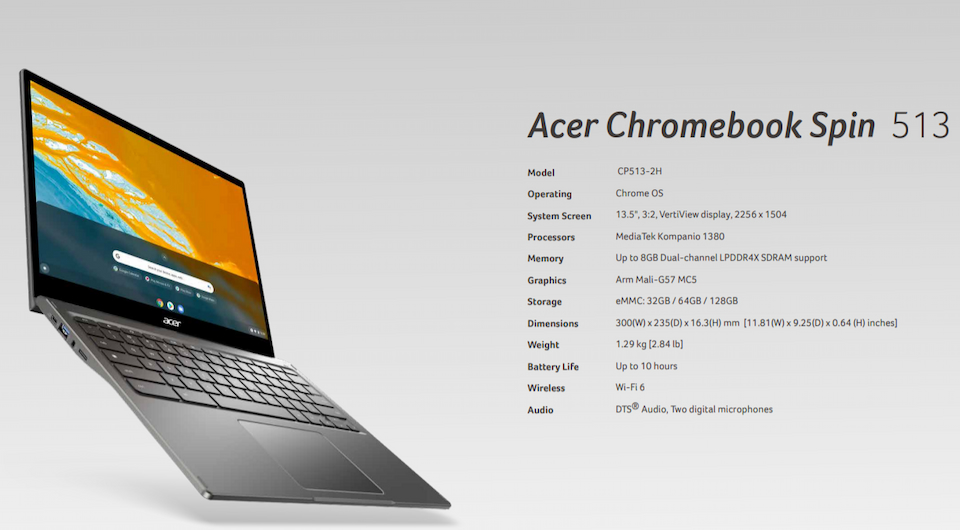Since CES a few weeks ago, I’ve been wondering about the upcoming MediaTek Kompanio 1380 chip that will power the 2022 Acer Chromebook Spin 513. Today, MediaTek offered a few more details about the silicon. And yes, it should be a very capable processor.
The MediaTek Kompanio is definitely meant specifically for Chromebooks. The design is largely what I expected: an octa-core chip with four Cortex A-78 cores meant for high-performance computing. Each of these cores is capable of running at a super speedy 3 GHz clock speed, although they may be limited to help with battery performance in the Acer Chromebook Spin 513. Also helping battery life is the fact that the chip is built on a small 6-nanometer process.
For reference, the current Qualcomm Snapdragon 7c compute platform found in some Chrome OS tablets is built on the older Cortex A-77 architecture. Moving to an A-78 design brings the Kompanio 1380 up to a more recent, power-efficient standard while also boosting performance.

Along with the CPU, a hexagon-core Mali-G57 GPU handles the graphics. This isn’t the fastest set of GPU cores but should still be more than adequate for traditional Chromebook use. This part of the package will let you power up a pair of 4K displays at 60 frames per second. Supplementing both is support for quad-channel LPDDR4X memory up to 2133 MHz.
I did inquire as to the remaining four CPU cores as I’d expect them to be of the Cortex A-55 type. These would be efficiency cores for tasks that don’t require the power of the A-78 cores. As of the time of writing, I did not hear back. Update: A MediaTek representative responded and confirmed there are four Cortex A-55 efficiency cores.
If this configuration sounds familiar, it’s because I speculated nearly exactly that earlier this month. I based my thoughts on these MediaTek Kompanio 1300T chip specifications:
The Kompanio 1300T chip is built on TSMC’s 6nm process technology and integrates an octa-core CPU with high performance Arm Cortex-A78 cores and power-efficient Arm Cortex-A55 cores. In addition, its high performance nine-core Arm Mali-G77 MC9 GPU provides premium computing performance and supports high frame rates for longer, smoother gaming.
Aside from the open question on the efficiency cores and the different GPU cores, these two chipsets are very similar. And the Kompanio 1380 will bring WiFi 6 / 6E and Bluetooth 5 to Chromebooks as well, not to mention AI capabilities as part of the package.

What does this all mean? Pretty much what I said earlier this month.
The MediaTek Kompanio 1380 “may be the most powerful ARM-based Chromebook to date, closing the gap between those and the many Intel-powered Chrome OS laptops on the market.” We’ll find out when the Acer Chromebook Spin 513 and other Chromebooks with this chip arrive.
Updated at 4:30 pm to reflect details on the four efficiency cores.


3 Comments
The Kompanio 1380 is unrelated to the Kompanio 1300T. Instead, it is merely the Kompanio 1200 with the Cortex-78 cores overclocked to 3 GHz and with the Wi-Fi 5 modem swapped out for a Wi-Fi 6 one. Everything else – the 6nm process, the Mali-G57 GPU – is consistent with the MT8195 ChromeOS laptop that ChromeUnboxed stated that Acer was likely going to ship 1Q2022 back in September:
https://chromeunboxed.com/acer-convertible-chromebook-mediatek-mt8195-kompanio-1200
And see the Kompanio line specs here:
https://en.wikipedia.org/wiki/List_of_MediaTek_processors#Kompanio_Series
The overclocking and the new Wi-Fi modem likely accounts for the delay to June. MediaTek is also playing games with their branding as usual, as there was no good reason to claim that what the equivalent of a Qualcomm Snapdragon 865 Plus (the same basic SOC that is overclocked and has other minor improvements) is the equivalent of a Qualcomm Snapdragon 888 (a completely different SOC, which the significantly better GPU would allow them to be able to at least claim). The difference between the 6 core Mali-G57 in this device and the 9 core Mali-G77 in the 1300T is huge, particularly since Google is now pushing Android gaming on Chromebooks, and the eventual arrival of LumaFusion will mean professional content creation on ChromeOS will be possible also. (A better GPU would also benefit Linux users various areas.)
As for “closing the gap between those and the many Intel-powered Chrome OS laptops on the market” … you might want to check out how people are going absolutely nuts over the Alder Lake Pentium Gold chips first.
https://wccftech.com/intels-most-entry-level-alder-lake-cpu-the-dual-core-celeron-g6900-has-single-core-performance-on-par-with-a-5-3-ghz-core-i9-10900k/
The window to use Cortex-A76 and Cortex-A78 to make progress in this area was 2-3 years ago and Google (by refusing to approve new ARM boards until late 2020) and their partners missed it. With Alder Lake – and AMD Zen 4 chips coming in late 2022 fabbed on Samsung’s 4nm process – https://www.tomshardware.com/news/amd-may-adopt-samsung-4lpp-for-chromebooks – then it is going to take 4 Cortex-X2 cores for ARM to keep up.
You did see that the 12th-gen Celeron and Pentium chips you referenced have 35W and 46W TDPs and are *desktop* chips, right? When you have that much power and a thermal threshold that’s 7 to 10 times greater than an ARM chip for mobile devices, that’s what you should expect from the performance. 😉
Thanks. However, the Core i9-10900K is a desktop chip also. Meaning that the Pentium Gold laptop chips are going to also make a corresponding leap in performance.
I understand your general point: the Kompanio 1380 will rival recent Intel Pentium and Core i3 chips, just as MediaTek is letting people now that the Kompanio 828 is competitive with 11th gen Jasper Lake: https://chromeunboxed.com/the-mid-range-mediatek-828-soc-shows-out-in-new-benchmark-comparison/
This means that we are finally going to get ARM Chromebooks that are capable of some real productivity work on non-SaaS apps beyond moderate LibreOffice and light VSCode stuff. I guess what Surface Pro X buyers – before Microsoft switched them from ARM to AMD last year – have been able to claim for awhile. But stating that they are closing the gap with Intel is a bridge too far now that Intel has adopted big.LITTLE, DDR5 RAM (while the tablet Kompanio processors support DDR5, the ChromeOS ones only support DDR4) and reached a 10nm process.
The Kompanio and Snapdragon Chromebooks that we are going to get this year and next are going to be great for their own sakes, but they won’t be competitive with Alder Lake and Raptor Lake Pentium, let alone Core i3 and higher.